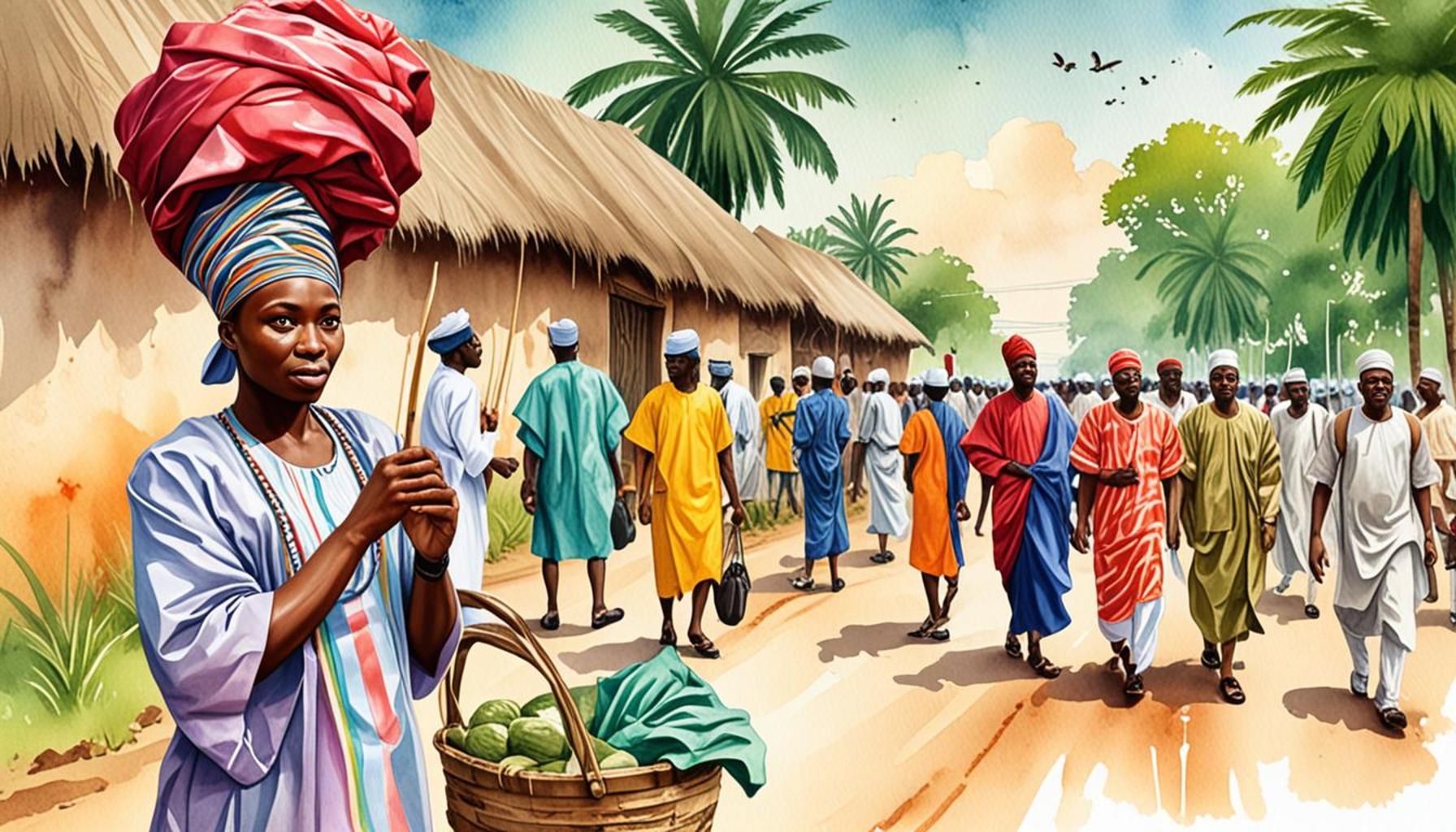Historical Pathways: Itineraries that Reveal Nigeria’s Cultural Heritage

Discovering the Essence of Nigeria’s Cultural Tapestry
Nigeria’s vibrant culture is an intricate mosaic of diverse ethnic groups, languages, and traditions that reflect its extensive history. With over 250 ethnic groups, Nigeria is home to a plethora of languages, customs, and belief systems that shape the daily lives of its people. This rich tapestry encompasses everything from ancient kingdoms to colonial legacies that have significantly influenced modern society. Each region tells its own story through art, music, dance, and oral traditions. As we embark on a journey through historical pathways, we invite you to explore itineraries that illuminate the essence of Nigeria’s vibrant past.
Key Itineraries to Explore
- Benin City: Step into the heart of the Benin Kingdom, known for its remarkable bronze sculptures and intricate ivory work. The famous Benin Moat, one of the largest earthworks in the world, and the Royal Palace of the Oba are must-see sites that echo the grandeur of the kingdom’s history. You can also visit the Benin Cultural Centre to witness traditional performances and craft exhibitions that honor the artistic excellence of the Edo people.
- Calabar: A city that served as a major port during the transatlantic slave trade, Calabar is rich in history and culture. The annual Calabar Carnival, often referred to as “Africa’s Biggest Street Party,” is a vibrant celebration of the Efik culture. Explore historical architecture such as the Slave History Museum and visit local markets to savor culinary delights including the famous Efik dish, Edikang Ikong, made with a rich blend of vegetables and meat.
- Kano: As one of the oldest cities in Nigeria, Kano is pivotal in understanding the ancient trade routes that crisscrossed Northern Nigeria. The ancient city wall, Goron Dutse, and the historic Kurmi Market tell stories of trade and cultural exchanges that pioneered an era of prosperity. Visitors can also appreciate the craftsmanship in traditional leather goods or partake in local festivals that showcase the Hausa-Fulani culture, known for their vibrant music and colorful dances.
- Jos: Known for its cooler climate and scenic views, Jos is a melting pot of cultures and traditions. The city hosts various festivals that celebrate its diverse ethnic groups, including the Berom, Ngas, and Afizere tribes. The Jos Museum, one of the oldest museums in Nigeria, is a treasure trove of artifacts that depict the region’s rich history. The renowned Jos Wildlife Park and the picturesque hills make this city not only a hub of cultural expression but also a beautiful escape into nature.
Each itinerary provides a unique lens through which to appreciate Nigeria’s cultural heritage. The landscapes, historical landmarks, and local customs serve as portals to the stories embedded in every corner of the nation. From indigenous art and architecture to local culinary delights, exploring these pathways not only educates travelers but also fosters a greater appreciation for the cultural richness that Nigeria has to offer. By walking these historical routes, visitors can engage with both the past and the present, gaining insight into the heart of Nigerian identity and its dynamic cultural legacy.
YOU MAY ALSO LIKE: Read read another article
Unearthing the Treasures of Nigeria’s Past
As travelers embark on journeys across Nigeria, they encounter layers of cultural heritage that speak to the soul of the nation. Each region is marked by unique histories, social intricacies, and artistic expressions that have been cultivated over centuries. The travelers who tread these historical pathways not only witness the remnants of ancient civilizations but also engage with the living cultures that continue to thrive today. Exploring these itineraries allows for an enriched understanding of Nigeria’s diverse cultural landscape.
Benin City: The Cradle of Artisan Mastery
Benin City, the capital of Edo State, is renowned for its historical significance and artistry. Once the center of the powerful Benin Kingdom, the city is famed for its bronze casting and intricate ivory carvings that depict the narratives of the monarchy and its legacies. Visitors can marvel at the Benin Bronzes, a collection of plaques and sculptures that narrate stories of the history and achievements of the Benin Empire. The Oba’s Palace, adorned with grand architecture, serves as a testament to the kingdom’s rich royal heritage. While in Benin, the vibrant cultural displays at the Benin Cultural Centre provide visitors with a chance to witness traditional dances, music, and craft-making demonstrations, showcasing the skill and creativity of the Edo people.
Calabar: Echoes of the Past
Calabar holds an essential place in Nigeria’s history, especially concerning the transatlantic slave trade. The city was a key port where many enslaved Africans commenced their harrowing journey. Today, visitors can explore the Slave History Museum, which presents sobering narratives and artifacts from this dark chapter of history. Yet, Calabar is also a beacon of cultural celebration, epitomized by the famous Calabar Carnival, which draws participants from across Nigeria and beyond. This lively event transforms the streets into a vibrant tapestry of color, dance, and music, allowing visitors to experience the richness of the Efik culture. Culinary enthusiasts can indulge in local dishes like Edikang Ikong, a nutritious vegetable soup that symbolizes the warm hospitality of the Efik people.
Kano: The Jewel of the North
Kano, one of Nigeria’s oldest cities, stands as a vital link to the historical trade routes that traversed Northern Nigeria. The grandeur of its ancient city walls and the bustling Kurmi Market reflect a legacy of commerce and cultural exchange. At Kurmi Market, visitors can immerse themselves in a sensory experience filled with spices, textiles, and handmade crafts. The craftsmanship of the local artisans, particularly in leather goods, exemplifies the skills honed over generations. Visitors at the local festivals, such as the colorful Durbar Festival, can experience the spirit of the Hausa-Fulani culture, characterized by its proud music, dance, and equestrian displays, deepening their appreciation for Nigeria’s diverse heritage.
These itineraries not only guide travelers through historic landmarks but also foster connections between past and present, allowing for a greater understanding of Nigeria’s cultural heritage. Each site visited becomes a chapter in the larger narrative that shapes Nigerian identity, offering glimpses into the resilience and dynamism of its people.
Unveiling Nigeria’s Cultural Narratives
As we explore the vast tapestry of Nigeria’s cultural heritage, it becomes evident that each region carries its own unique story, enriched by centuries of history. These historical pathways open a window to diverse ethnic traditions, storytelling, art, and cuisine, inviting visitors and locals alike to engage in a profound cultural experience. The itineraries are meticulously crafted to encompass key historical sites, from ancient kingdoms to colonial legacies. For instance, the journey through the city of Benin allows travelers to witness the grandeur of the Benin Kingdom, famed for its sophisticated artistry and iconic bronze works. Meanwhile, Calabar showcases the rich cultural heritage of the Efik people, notably during the famed Calabar Carnival, highlighting their vibrant festivals and culinary excellence. This is just a taste of what these paths offer.The itineraries are not mere sightseeing adventures; they serve as a bridge that connects participants with the local communities. Through authentic interactions, travelers gain insights into the crafts and trades that have been passed down through generations. Workshops in traditional weaving, pottery, and even culinary classes have become a mainstay of these experiences, promoting sustainable tourism while ensuring cultural preservation.Moreover, these historical pathways also allow one to appreciate the diversity of Nigeria, as they traverse through various landscapes, from the rugged terrains of the North to the lush greenery in the South. Each region showcases its uniqueness, allowing visitors to learn about local folklore, traditional music, and artistic expressions that reflect the soul of the people.In advancing the understanding of Nigerian heritage, educational institutions have collaborated with cultural organizations to facilitate seminars and discussions on the significance of preserving these itineraries. By fostering a sense of responsibility towards cultural heritage, stakeholders aim to galvanize support for conservation efforts, ensuring these pathways remain vibrant for future generations.Now, for a clearer understanding of the advantages offered by these heritage itineraries, consider the table below:
| Category | Benefits |
|---|---|
| Cultural Immersion | Engagement with local traditions and practices |
| Educational Opportunities | Workshops on traditional crafts and cultural discourse |
As we delve deeper into these cultural journeys, the desire to explore the richness of Nigeria’s heritage continues to grow, beckoning adventurers, scholars, and curious minds to experience the stories waiting to be told.
CHECK OUT: Click here to explore more
Celebrating Nigeria’s Multicultural Tapestry
Nigeria’s cultural heritage is not merely defined by its historical sites but also by the living traditions that color the everyday life of its people. Across the landscape—from the vibrant hustle of urban centers to the serene rhythms of village life—this rich cultural tapestry invites exploration and celebration. These itineraries not only take one through ancient landmarks but also foster deeper connections with diverse communities, illuminating the stories behind the art, music, and rituals of the Nigerian people.
Ibadan: The Intellectual Heritage
As the largest city in West Africa, Ibadan boasts a storied past as a center of education and intellectual discourse. The city is home to the historic University of Ibadan, Nigeria’s premier university, which sits on land that once housed the first Nigerian university, further solidifying its legacy. One can visit Aleshinloye Market, where you’ll find locally crafted textiles and artisanal crafts that reflect the ingenuity of the local artisans. Festivals such as the Ibadan Cultural Festival celebrate the city’s unique identity and showcase performances that include traditional Yoruba music and dance, providing insight into the cultural practices that thrive in the heart of Yoruba land.
Lagos: The Melting Pot of Cultures
In Lagos, the bustling commercial capital, history seamlessly intersects with contemporary culture. The Nigerian National Museum houses a vast collection of artifacts—including the Terra Cotta Heads and Bronze sculptures—that narrate the rich history of the country’s diverse ethnic groups. As you stroll along the beaches of Elegushi or Lekki, you can immerse yourself in the fusion of old and new as local vendors serve traditional dishes alongside modern delicacies. The Festac Festival, held in the spirit of the African Arts Festival, transforms the city into a whirlwind of artistic expression, featuring performances from renowned artists that reflect Nigeria’s diverse heritage.
Owerri: A Celebration of Igbo Culture
Known as the “Heartland” of the Igbo people, Owerri is steeped in culture and tradition. The city’s annual Imo State Carnival showcases Igbo music and dance, featuring elaborately adorned floats that express the region’s heritage. One significant cultural landmark, the Mbari Cultural and Art Centre, stands as a symbol of artistic creativity, celebrating the spiritual and artistic traditions of the Igbo culture through visually stunning sculptures and art. Visitors can also experience a traditional Igbo Wedding, a lively ceremony that involves colorful attire, music, and dance, illustrating the depth of commitment to cultural preservation in the region.
- Historical Significance: Each region provides evidence of Nigeria’s rich history, from ancient empires to colonization.
- Artistic Expression: The artistry seen in various local crafts reflects the aesthetic sensibilities of different cultures.
- Culinary Delights: Engaging with local dishes not only satiates hunger but provides a flavor of cultural stories passed down through generations.
Pursuing these itineraries through Nigeria uncovers insights into the multifaceted cultural legacies that exist today. From the ceremonial grandeur of traditional festivals to the simple majesty of local markets, every exploration celebrates the vibrancy and diversity of Nigerian heritage, urging travelers to connect with the essence of the people and the land.
YOU MAY ALSO LIKE: Read read another article
Embracing Nigeria’s Rich Heritage
In conclusion, Nigeria’s cultural heritage is an intricate mosaic shaped by centuries of history, tradition, and artistic expression. The itineraries explored—from the intellectual landmarks of Ibadan to the cultural crossroads of Lagos and the vibrant traditions of Owerri—open a window into the soul of a nation that thrives on diversity. Each stop not only serves as a testament to Nigeria’s storied past but also as an invitation to engage with the living tapestry that continues to evolve today.
Traveling through these historical pathways encourages a deeper understanding of Nigeria’s unique identity, as visitors uncover the local narratives that breathe life into ancient sites and contemporary practices alike. Whether it’s savoring the mouthwatering flavors of local cuisines or witnessing traditional festivals that celebrate age-old customs, every experience serves as a reminder of the rich heritage embedded within the communal fabric of Nigerian life.
As global travelers increasingly seek authenticity in their journeys, exploring Nigeria’s various cultural pathways stands as a compelling opportunity to connect with the heartbeat of the nation. For those drawn to stories of resilience, creativity, and unity, immersing oneself in Nigeria’s cultural heritage promises not just a voyage through space, but also a profound journey through time. Let every discovery inspire a reverence for the rich history and the dynamic cultures that define Nigeria.


